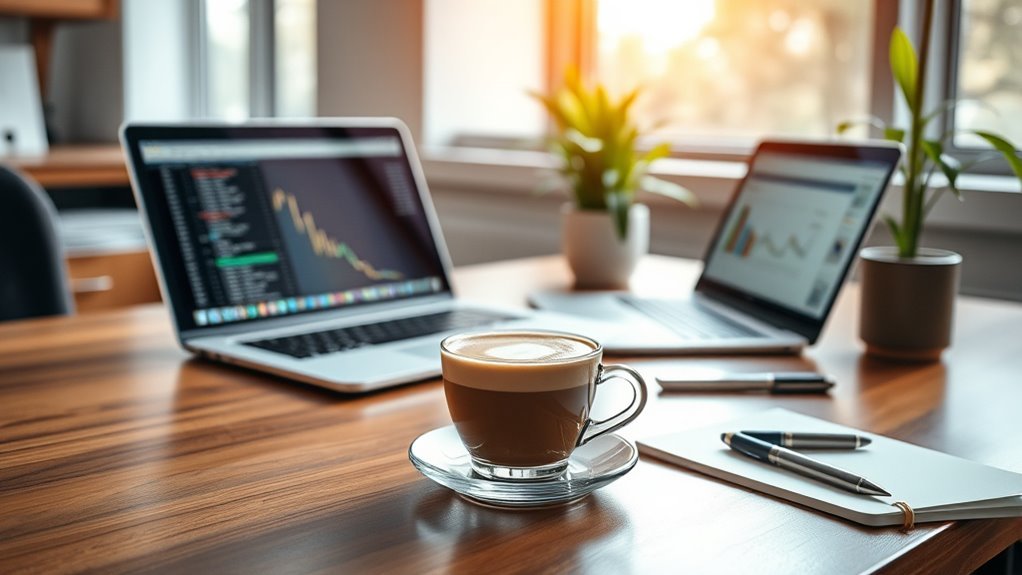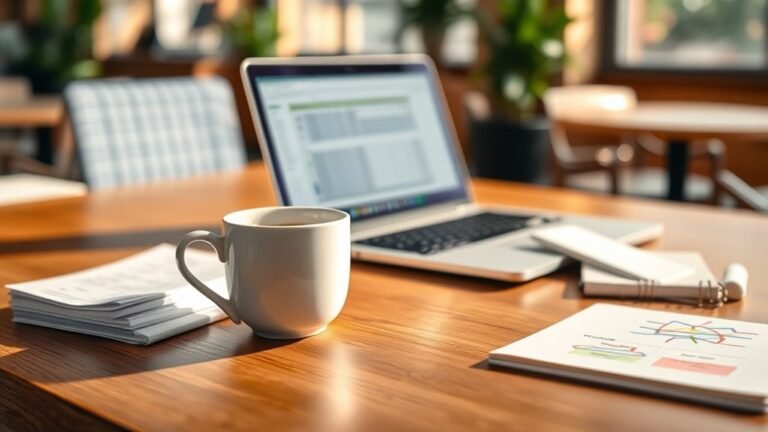Can You Write off Coffee as a Business Expense
You can write off coffee as a business expense, but only if it meets specific IRS guidelines. To qualify, the coffee must serve a business purpose, like client meetings or networking. You’ll need to document each purchase with receipts, including details like date and purpose. Only 50% of meal expenses, including coffee, is deductible. Misunderstandings can lead to missed deductions, so understanding the full context is essential. There’s more to explore on this topic that may benefit you.
Understanding Business Expenses
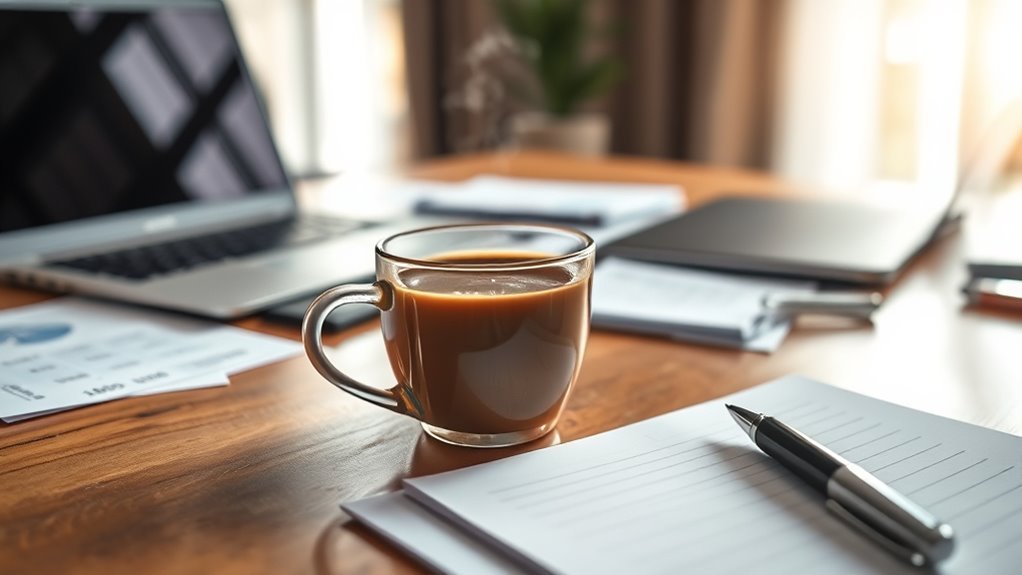
When you’re running a business, understanding what qualifies as a business expense is vital for effective financial management. Business classifications can vary considerably, but recognizing which expenses are deductible is important for maximizing your tax benefits. You’ll need to focus on expense tracking to guarantee you’re documenting every eligible cost accurately. This involves categorizing expenses based on their nature, such as operational, marketing, or administrative. By maintaining clear records, you not only simplify tax preparation but also gain insights into your overall financial health. This awareness empowers you to make informed decisions that align with your goal of financial freedom, allowing you to allocate resources more effectively and ultimately enhance your business’s profitability.
The IRS Guidelines on Deductible Expenses
When considering coffee as a deductible expense, it’s vital to understand the IRS guidelines regarding what constitutes an ordinary and necessary expense for your business. You’ll need to distinguish between business and personal use to guarantee compliance. Misclassification can lead to disallowed deductions, so clarity in your expense tracking is imperative.
Ordinary and Necessary Expenses
To determine whether a coffee expense can be written off as a business deduction, it is vital to understand the IRS guidelines on “ordinary and necessary” expenses. These guidelines help you assess if your coffee costs qualify for deduction. Here are key points to reflect on:
- Commonality: Is coffee a standard offering in your industry?
- Business Purpose: Does coffee consumption directly relate to your work activities?
- Expense Tracking: Are you keeping detailed records of your coffee purchases?
- Coffee Benefits: Do you use coffee to enhance productivity during work hours?
Business vs. Personal Use
Understanding the distinction between business and personal use is crucial for determining the deductibility of coffee expenses. The IRS stipulates that only coffee consumption directly related to your business can be written off. If you’re purchasing coffee for business meetings or client gatherings, those expenses may qualify as deductible. However, coffee consumed during your personal time, even if you’re working, isn’t deductible. You need to maintain clear records to differentiate between the two. Keep receipts and note the context of each purchase to support your claims. Fundamentally, if the coffee fuels your business efforts and fosters professional relationships, it stands a better chance of being considered a legitimate business expense.
Criteria for Deducting Meals and Beverages
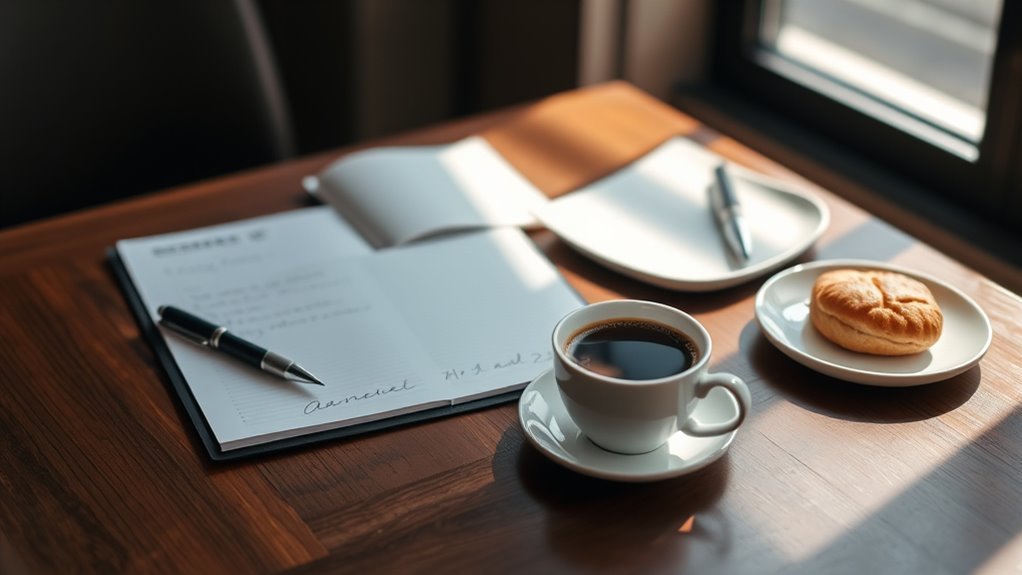
When considering deductions for meals and beverages, you need to meet specific criteria set by the IRS. It’s crucial to establish a business purpose for each meal, maintain proper documentation, and be aware of any cost limitations. Understanding these factors can help you maximize your deductions while staying compliant with tax regulations.
Business Purpose Requirement
While many business owners enjoy coffee as part of their daily routine, it’s important to recognize that claiming it as a deductible expense hinges on meeting specific business purpose requirements. To qualify for deductions, verify your coffee expenses align with:
- Business Networking: Coffee meetings that foster professional relationships.
- Client Meetings: Providing coffee during discussions with clients to enhance comfort and engagement.
- Employee Meetings: Offering coffee during team discussions to promote collaboration.
- Business Travel: Purchasing coffee while traveling for business purposes.
Documentation and Receipts
To guarantee you can successfully deduct coffee expenses, it’s essential to maintain proper documentation and receipts. Effective receipt management and expense tracking are crucial for substantiating your claims. Here’s a quick reference table to keep you organized:
| Item | Details |
|---|---|
| Date | When the purchase was made |
| Amount | Total cost of the coffee |
| Purpose | Business-related meeting |
| Receipt Type | Digital or paper receipt |
Having this information on hand helps you substantiate your deductions during tax season. Make it a habit to store receipts and notes about your coffee purchases, ensuring you’re prepared if the IRS comes knocking. Staying organized will empower your financial freedom.
Meal Cost Limitations
Maintaining meticulous documentation and receipts is just the start; understanding the limitations on meal costs is essential for accurately deducting expenses. Here are some key meal limitations you should consider:
- 50% Limitation: Generally, you can only deduct 50% of the cost of meals related to business activities.
- Directly Related: The meal must be directly related to business operations or meetings.
- Business Environment: Meals should occur in a conducive business setting, not lavish restaurants.
- Documentation: You need to maintain detailed records, including who, when, and why the meal was incurred.
Specifics on Coffee as a Business Expense
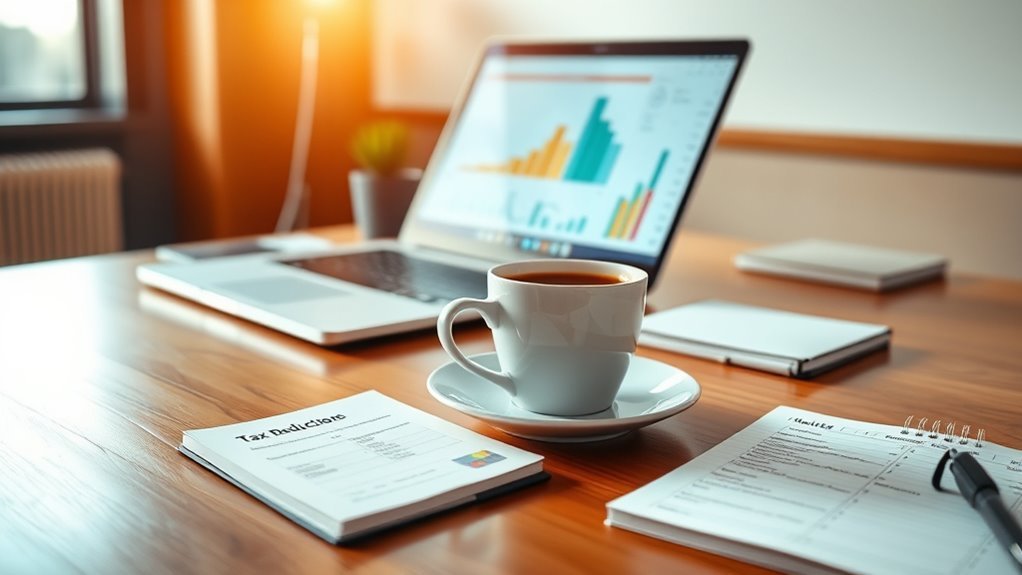
Coffee can be an intriguing yet often overlooked business expense, especially for those in industries that thrive on social interaction or client meetings. When considering coffee as a business expense, think about its role in coffee networking—those casual meet-ups that often lead to valuable connections. While you can’t deduct every cup, expenses incurred during client meetings or team brainstorming sessions may qualify, especially if they enhance productivity. A productivity boost from caffeine can justify your investment, making it more than just a daily ritual. Always assess the context: if coffee fuels discussions that directly relate to your business, you might find that it’s not just a beverage but a strategic asset in your entrepreneurial toolkit.
Documenting Your Coffee Expenses
When it comes to claiming coffee as a business expense, accurate documentation is key. To guarantee your coffee expenses are properly tracked, follow these four steps:
- Keep Receipts: Always save your receipts, as they serve as proof of your purchases.
- Log Details: Record the date, amount, and purpose of each coffee purchase. This helps clarify its business relevance.
- Use Expense Tracking Tools: Consider apps or software that simplify tracking your coffee expenses and categorize them effectively.
- Review Regularly: Periodically review your documentation to ensure everything aligns with your business activities.
Common Misconceptions About Deductions
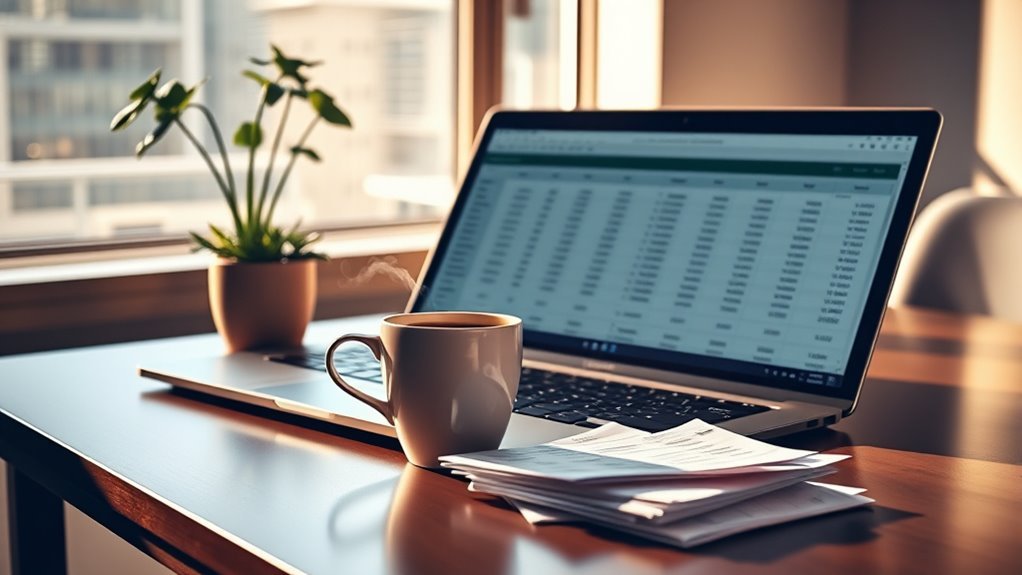
While many entrepreneurs understand the importance of deducting business expenses, misconceptions about what qualifies can lead to missed opportunities or even compliance issues. A common pitfall is assuming all coffee expenses are deductible. Many believe that any purchase related to coffee—whether for personal use or casual office gatherings—qualifies as a business deduction. However, only coffee expenses directly tied to business activities are legitimate. This confusion around misunderstood deductions can result in audits or denied claims. It’s essential to differentiate between personal enjoyment and business necessity. By understanding the specific criteria for deducting coffee expenses, you can make informed decisions and optimize your tax strategy without falling prey to misconceptions that could jeopardize your financial freedom.
Alternatives to Writing Off Coffee Expenses
Misunderstandings about coffee deductions can lead to missed opportunities for legitimate business expense claims. Instead of trying to write off coffee, consider these coffee alternatives that might better align with your business needs and help you maximize tax credits:
Misunderstandings about coffee deductions can result in lost opportunities for legitimate business expenses. Explore better alternatives to maximize your tax benefits.
- Office Supplies: Invest in items that enhance productivity, like planners and stationery.
- Client Meals: Deduct business-related meals that foster relationships, rather than individual coffee purchases.
- Networking Events: Attend industry conferences or workshops where refreshments are included as part of the cost.
- Home Office Expenses: If you work from home, consider claiming a portion of your utility bills instead.
These options can provide substantial benefits, allowing you to maximize your deductions without the complexities surrounding coffee expenses.
Seeking Professional Advice on Tax Deductions
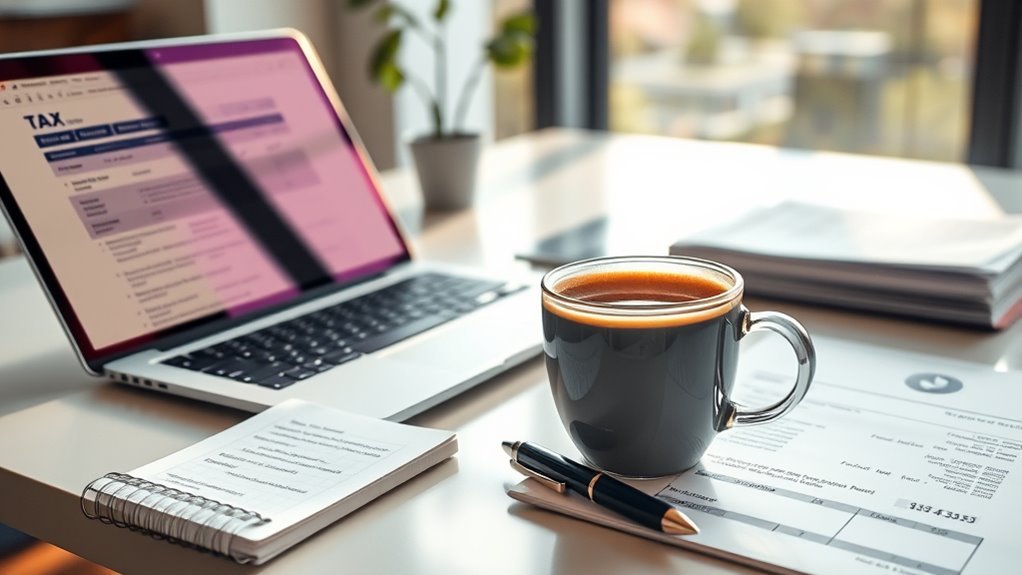
Maneuvering the complexities of tax deductions can be intimidating, especially when it comes to determining what qualifies as a legitimate business expense. To navigate this landscape effectively, seeking guidance from a tax professional is essential. They can provide tailored advice on what you can deduct, ensuring you’re not leaving money on the table. A financial advisor can also help you understand the broader implications of your deductions on your overall financial strategy. They’ll analyze your specific situation and help you make informed decisions that align with your goals. Remember, investing in professional advice can save you time and potential headaches, allowing you to focus on growing your business while maximizing your tax benefits.
Frequently Asked Questions
Can I Deduct Coffee Purchased for Personal Use?
You can’t deduct personal coffee expenses on your taxes. If you’re buying coffee strictly for personal enjoyment, it doesn’t qualify as a deductible expense. However, if you purchase coffee for business purposes, like client meetings or office supplies, that could be deductible. It’s crucial to clearly separate your personal coffee from business coffee to guarantee you’re compliant with tax regulations while maximizing your potential deductions. Keep thorough records for any business-related purchases.
What Types of Coffee Expenses Are Typically Non-Deductible?
When you’re steering through coffee business policies, it’s essential to know what expenses are non-deductible. Personal coffee purchases, those enjoyed at home or during leisure, can’t be deducted. Similarly, any beverages that don’t directly relate to business activities—like coffee bought for personal entertainment—fall into the non-deductible category. Understanding these distinctions helps you maintain financial clarity while enjoying your freedom to indulge in your favorite brews.
Are There Limits on Coffee Expense Deductions?
When it comes to coffee deduction limits, you’ll want to be aware of the business meal guidelines. Generally, you can deduct 50% of meal expenses, including coffee, if they’re directly related to your business. However, keep in mind that extravagant or lavish expenses might not qualify. It’s important to maintain accurate records and verify your coffee expenses align with legitimate business activities to maximize your deductions while staying compliant with tax regulations.
Can Coffee Expenses Be Deducted for Remote Work?
When considering coffee expenses for remote work, it’s important to note that personal consumption typically doesn’t qualify for deductions. However, if you’re using coffee to fuel your productivity and it’s directly related to your business, there may be potential for some deductions. Keep track of your coffee consumption during work hours and consult a tax professional to navigate the specifics, ensuring you maximize your deductions while enjoying that essential cup of joe.
How Do I Report Coffee Expenses on My Taxes?
When you’re tracking coffee expenses, it’s essential to follow the right guidelines. For example, if you often meet clients at a cafe, you can document those coffee purchases as business expenses. To report these on your taxes, keep detailed records, including receipts and the purpose of each purchase. Make certain your coffee expense tracking aligns with IRS rules, so you’re prepared if questions arise during an audit. Being organized can give you financial freedom.
